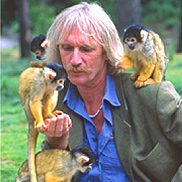Renowned primatologist’s incarceration in Brazil is an attack on science
Scientists demand Brazil release renowned primatologist
Biologist’s incarceration is an attack on science, say scientists
mongabay.com
August 6, 2007
UPDATE: Roosmalen freed from prison pending appeal
UPDATE 2: Primatologist freed but questions remain for Brazil
A prominent group of scientists have issued a petition to free world-renowned primatologist Marc van Roosmalen from Brazilian prison after he was charged with illegally keeping monkeys without a permit and other crimes. The scientists have called his imprisonment an “attack on the practice and profession of biological science in Brazil.”
Van Roosmalen, 60, was sentenced in June to 15 years and 9 months by a federal court for allegedly keeping wild animals without a permit and embezzlement. The scientist, who has worked in the Amazon for nearly 20 years and is credited with the discovery of several previously unknown species of monkeys, was named a “hero for the planet” by Time magazine in 2002 for his work to save the increasingly threatened Amazon rainforest.
Scientists fight back
In a petition issued at their annual meeting in Morelia, Mexico, scientists from the Association for Tropical Biology and Conservation scientists said that van Roosmalen’s sentence is “excessive”, indicates “biased treatment” of his case by the judicial system in Brazil, and represents an “attack” on biological science by authorities. They call for his immediate release from prison.
 Help Marc van Roosmalen |
“We the undersigned scientists protest and condemn the sentencing of Dr. Marc van Roosmalen as being out proportion with his alleged crimes and as being indicative of governmental restrictions on scientists, and request the Brazilian government to immediately release Dr. van Roosmalen from jail in order to protect his health and life, to review the manner in which the trial was conducted, and to examine the relationship that this particular trial has to the current governmental limitations placed on scientists in Brazil,” said a petition signed by 287 scientists and circulated at the Association for Tropical Biology and Conservation (ATBC) meeting.
The petition notes that despite his Brazilian nationality, van Roosmalen was tried as a foreigner, and that he was denied habeas corpus and an appeal on a technicality, moves which ATBC says are “not customary”. Further, notes the document, van Roosmalen’s sentence for his alleged crimes are unusually harsh; typically a person in Brazil would not be jailed for a first offense of this type. The most serious accusations, those of “biopiracy” were dropped.
“16 years is an excessive sentence for the infractions mentioned, and, for a man of Dr. van Roosmalen’s age, temperament and condition is tantamount to a death sentence,” stated the petition. “Scientists worldwide consider Dr. van Roosmalen’s indictment and sentencing as an attack on the practice and profession of biological science in Brazil, and as an attack on individual scientists.”
“At a time when ecological research is more critical than ever to enable the wise use and management of plants, animals and microbes in the world’s tropics, Dr. van Roosmalen’s indictment, trial, sentencing, incarceration and the associated media response is already discouraging biological research in Brazil, both by Brazilian scientists and by potential international collaborators,” the petition continued. “Dr. van Roosmalen’s situation is indicative of a trend of governmental repression of scientists in Brazil.”
Retribution?
While the scientists made no formal accusations towards the Brazilian government, some suspect that van Roosmalen’s adversaries are behind his incarceration. Van Roosmalen’s work has put him at odds with cattle ranchers, farmers, and illegal loggers who are driving forest clearing in the region, which has lost more than 55,000 square miles (142,000 square kilometers) of forest since 2000. These development interests have been linked to a number of incidents, including the high profile killing of rubber tapper Chico Mendes in 1988 and the 2005 slaying of American nun Dorothy Stang. Following Stang’s murder, the Brazilian government sent in thousands of troops in an attempt to quell the violence and regain control over the lawless region. Conservationists, social workers, and indigenous rights groups have been at particular risk in frontier areas.
“It’s a vendetta,” John Chalmers, an English businessman who has worked with the scientist for four years, told The Guardian. “The only way to protect the Amazon is to make people aware of all these species. Marco tried to preserve the species and their natural habitat. This does not suit politicians who own large tracts of land full of logs that they want to sell.”
Van Roosmalen’s arrest is not the first time he’s been in trouble with local authorities. In 2002, the Dutch scientist turned Brazilian citizen was charged with animal trafficking and fined $1,667. At the time, Van Roosmalen told the Associated Press that the accusations were questionable since the animals were rescued from loggers who planned to eat the animals.
“I never take animals out of natural environment even for scientific purposes,” Van Roosmalen said. “You have to wonder why after 16 years they are doing this now.”
Brazil has some of the toughest environmental regulations in the world, but they are haphazardly enforced. A slow approvals process–for permits ranging from scientific research to development–has been blamed for fueling endemic corruption. Scientists often complain that the process of obtaining official permission can drag out for months to years without “special payments.”
In the 2002 case, Van Roosmalen told the Associated Press that he applied for permissions from Ibama in 1996, 1998 and 2000 but never heard back. The A.P. noted that it permissions are generally granted by default if Ibama, Brazil’s environmental enforcement agency, does not respond within 45 days.
Petition Regarding Primatologist Dr. Marc Van Roosmalen
Help Dr. Marc Van Roosmalen
UPDATE: van Roosmalen freed from prison pending appeal
The article is an update from a previous mongabay.com article